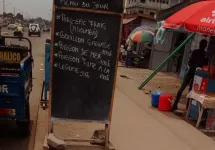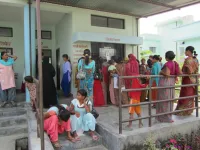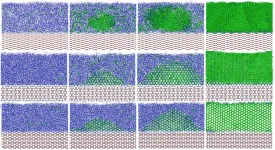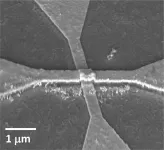INFORMATION:
WCS (Wildlife Conservation Society)
MISSION: WCS saves wildlife and wild places worldwide through science, conservation action, education, and inspiring people to value nature. To achieve our mission, WCS, based at the Bronx Zoo, harnesses the power of its Global Conservation Program in nearly 60 nations and in all the world's oceans and its five wildlife parks in New York City, visited by 4 million people annually. WCS combines its expertise in the field, zoos, and aquarium to achieve its conservation mission. Visit: newsroom.wcs.org Follow: @WCSNewsroom. For more information: 347-840-1242.
Using conservation criminology to understand restaurant's role in urban wild meat trade
Restaurants in Central African urban areas are key drivers in keeping protected wildlife on the menu
2021-03-18
(Press-News.org) KINSHASA, DEMOCRATIC REPUBLIC OF CONGO (March 18, 2021) - A new study in the journal Conservation Science and Practice finds that restaurants in urban areas in Central Africa play a key role in whether protected wildlife winds up on the menu.
The study, by a team of scientists from Michigan State University, Wildlife Conservation Society (WCS), and University of Maryland, used a crime science "hot product" approach, which looks at frequently stolen items coveted by thieves. The approach offered new insights into wildlife targeted by the urban wild meat trade and can inform urban wildlife policies.
The study engaged lower, middle, and upper-level tiered restaurants to understand which species were traded. The findings revealed that procurement of wild meat by restaurants was more targeted than opportunistic, with monkeys identified as "hot products" - species most at risk of being targeted by the urban wild meat trade in both Kinshasa and Brazzaville, the respective capital cities of Democratic Republic of Congo and Republic of Congo.
Restaurants in Brazzaville were more aware of laws and revealed a wider variety of wild meat species at risk of illegal trade. This could be suggestive that awareness of laws is not an effective deterrent against illegal activity, and instead might lead to adaptive practice, such as diversifying the range of products offered, and in doing so spreading out the risk associated with any one particular species.
Though the wild meat trade can and does exist legally, it crosses into illegality when sourcing wildlife that are protected from poaching by national laws and regulations. These can include hunting in protected areas, outside of permitted seasons, beyond set quotas, hunting protected species, or by individuals without permits) or from trading across borders by international laws.
Looking at consumer demand alone, besides monkeys, restaurant customers also commonly requested antelopes. The study found that although consumer demand is an important consideration for restaurants' purchasing decisions, it did not account for the cost and effort required to source a tradeable product. When factoring this in, pangolins were also identified as being at risk from the wild meat trade. This suggests the need to work with other supply chain actors besides consumers.
Knowing which wildlife are most at risk in urban centers can be helpful in focusing law enforcement efforts on compliance with species-specific rules say the authors.
"Restaurants have the potential to help reduce risks from the illegal wildlife trade and make their livelihoods more sustainable. Working with restaurants can also help build a community of informal wildlife guardians complementing law enforcement and legislative action, in a multi-pronged approach," said Sarah Gluszek, lead author now working for FFI.
The illegal wildmeat trade is a problem for urban zones in Central Africa, but the dynamics of the trade are poorly understood. At unsustainable rates and in illegal contexts, the wild meat trade is a driver of species extinction; it can also threaten ecosystem services, local food security and contribute to the risk of zoonotic disease spread.
ELSE PRESS RELEASES FROM THIS DATE:
Study reveals significant concerns over growing scale of sex selective abortions in Nepal
2021-03-18
Detailed, new analysis published this week in the British Medical Journal (BMJ) Open highlights significant concerns about a growing issue of sex selective abortion of girls in Nepal.
Drawing on census data from 2011 and follow-on survey data from 2016, the social scientists estimate that roughly one in 50 girl births were 'missing' from records (i.e. had been aborted) between 2006-11 (22,540 girl births in total). In the year before the census (June 2010 - June 2011) this had risen to one in 38.
For certain areas of the country, the practice was more widespread. In Arghakhanchi, the most affected district, one in every six girl births were 'missing' in census data. In the Kathmandu Valley, Nepal's main urban centre, around 115 boys are born for ...
Babies pay attention with down payment from immature brain region
2021-03-18
Anyone who has watched an infant's eyes follow a dangling trinket dancing in front of them knows that babies are capable of paying attention with laser focus.
But with large areas of their young brains still underdeveloped, how do they manage to do so?
Using an approach pioneered at Yale that uses fMRI (or functional magnetic resonance imaging) to scan the brains of awake babies, a team of university psychologists show that when focusing their attention infants under a year of age recruit areas of their frontal cortex, a section of the brain involved in more advanced functions that was previously thought to be immature in babies. The findings were ...
Organic crystals' ice-forming superpowers
2021-03-18
At the heart of clouds are ice crystals. And at the heart of ice crystals, often, are aerosol particles - dust in the atmosphere onto which ice can form more easily than in the open air.
It's a bit mysterious how this happens, though, because ice crystals are orderly structures of molecules, while aerosols are often disorganized chunks. New research by Valeria Molinero, distinguished professor of chemistry, and Atanu K. Metya, now at the Indian Institute of Technology Patna, shows how crystals of organic molecules, a common component of aerosols, can get the ...
Animal behaviour: Female wild bonobos provide care for infants outside their social group
2021-03-18
Observations of groups of wild bonobos, reported in Scientific Reports, suggest that two infants may have been adopted by adult females belonging to different social groups. The findings may represent the first report of cross-group adoption in wild bonobos, and potentially also the first cases of cross-group adoption in wild apes.
Bonobos form social groups of multiple males and females that sometimes temporarily associate with one another. Nahoko Tokuyama and colleagues observed four groups of wild bonobos between April 2019 and March 2020 in the Luo Scientific Reserve in Wamba, Democratic Republic of the Congo. The authors identified two infants whom ...
Palaeontology: Prehistoric armoured dinosaur may have been able to dig
2021-03-18
Newly excavated skeletal remains of an ankylosaurid -- a large armoured herbivore that lived during the Cretaceous Period -- may indicate that members of this family of dinosaurs were able to dig, according to a study published in Scientific Reports. The specimen, known as MPC-D 100/1359, may further our understanding of ankylosaurid behaviour during the Late Cretaceous (84-72 million years ago).
Yuong-Nam Lee and colleagues excavated the skeletal elements of MPC-D 100/1359 from a deposit of the Baruungoyot Formation in the southern Gobi Desert, Mongolia, ...
New analysis shows potential for 'solar canals' in California
2021-03-18
UC Santa Cruz researchers published a new study--in collaboration with UC Water and the Sierra Nevada Research Institute at UC Merced--that suggests covering California's 6,350 km network of public water delivery canals with solar panels could be an economically feasible means of advancing both renewable energy and water conservation.
The concept of "solar canals" has been gaining momentum around the world as climate change increases the risk of drought in many regions. Solar panels can shade canals to help prevent water loss through evaporation, and some types of solar panels also work better over canals, because the cooler environment keeps them from overheating. ...
Artificial neuron device could shrink energy use and size of neural network hardware
2021-03-18
Training neural networks to perform tasks, such as recognizing images or navigating self-driving cars, could one day require less computing power and hardware thanks to a new artificial neuron device developed by researchers at the University of California San Diego. The device can run neural network computations using 100 to 1000 times less energy and area than existing CMOS-based hardware.
Researchers report their work in a paper published Mar. 18 in Nature Nanotechnology.
Neural networks are a series of connected layers of artificial neurons, where the output of one layer provides the ...
System detects errors when medication is self-administered
2021-03-18
From swallowing pills to injecting insulin, patients frequently administer their own medication. But they don't always get it right. Improper adherence to doctors' orders is commonplace, accounting for thousands of deaths and billions of dollars in medical costs annually. MIT researchers have developed a system to reduce those numbers for some types of medications.
The new technology pairs wireless sensing with artificial intelligence to determine when a patient is using an insulin pen or inhaler, and flags potential errors in the patient's administration method. "Some past work reports that up to 70% of patients do not ...
Researchers identify a way to reverse high blood sugar and muscle loss
2021-03-18
A study by Monash University has uncovered that liver metabolism is disrupted in people with obesity-related type 2 diabetes, which contributes to high blood sugar and muscle loss - also known as skeletal muscle atrophy.
Using human trials as well as mouse models, collaborative research led by Dr Adam Rose at Monash Biomedicine Discovery Institute has found the liver metabolism of the amino acid alanine is altered in people with obesity-related type 2 diabetes. By selectively silencing enzymes that break down alanine in liver cells, high blood sugar and muscle loss can be reversed by the restoration of skeletal muscle protein synthesis, a critical determinant of muscle size and strength.
The research, published today in Nature Metabolism, has shown the altered liver metabolism ...
Scientists see cross-group adoption of young bonobo apes in the wild for the first time
2021-03-18
Scientists have witnessed bonobo apes adopting infants who were born outside of their social group for the first time in the wild.
Researchers, including psychologists at Durham University, UK, twice saw the unusual occurrence among bonobos in the Democratic Republic of Congo, in central Africa.
They say their findings give us greater insight into the parental instincts of one of humans' closest relatives and could help to explain the emotional reason behind why people readily adopt children who they have had no previous connection with.
The research, led by Kyoto University, in Japan, is published in the journal Scientific Reports.
Researchers observed a number of bonobo groups over several years in the Wamba area of ...
LAST 30 PRESS RELEASES:
New knowledge on heritability paves the way for better treatment of people with chronic inflammatory bowel disease
Under the Lens: Microbiologists Nicola Holden and Gil Domingue weigh in on the raw milk debate
Science reveals why you can’t resist a snack – even when you’re full
Kidney cancer study finds belzutifan plus pembrolizumab post-surgery helps patients at high risk for relapse stay cancer-free longer
Alkali cation effects in electrochemical carbon dioxide reduction
Test platforms for charging wireless cars now fit on a bench
$3 million NIH grant funds national study of Medicare Advantage’s benefit expansion into social supports
Amplified Sciences achieves CAP accreditation for cutting-edge diagnostic lab
Fred Hutch announces 12 recipients of the annual Harold M. Weintraub Graduate Student Award
Native forest litter helps rebuild soil life in post-mining landscapes
Mountain soils in arid regions may emit more greenhouse gas as climate shifts, new study finds
Pairing biochar with other soil amendments could unlock stronger gains in soil health
Why do we get a skip in our step when we’re happy? Thank dopamine
UC Irvine scientists uncover cellular mechanism behind muscle repair
Platform to map living brain noninvasively takes next big step
Stress-testing the Cascadia Subduction Zone reveals variability that could impact how earthquakes spread
We may be underestimating the true carbon cost of northern wildfires
Blood test predicts which bladder cancer patients may safely skip surgery
Kennesaw State's Vijay Anand honored as National Academy of Inventors Senior Member
Recovery from whaling reveals the role of age in Humpback reproduction
Can the canny tick help prevent disease like MS and cancer?
Newcomer children show lower rates of emergency department use for non‑urgent conditions, study finds
Cognitive and neuropsychiatric function in former American football players
From trash to climate tech: rubber gloves find new life as carbon capturers materials
A step towards needed treatments for hantaviruses in new molecular map
Boys are more motivated, while girls are more compassionate?
Study identifies opposing roles for IL6 and IL6R in long-term mortality
AI accurately spots medical disorder from privacy-conscious hand images
Transient Pauli blocking for broadband ultrafast optical switching
Political polarization can spur CO2 emissions, stymie climate action
[Press-News.org] Using conservation criminology to understand restaurant's role in urban wild meat tradeRestaurants in Central African urban areas are key drivers in keeping protected wildlife on the menu



